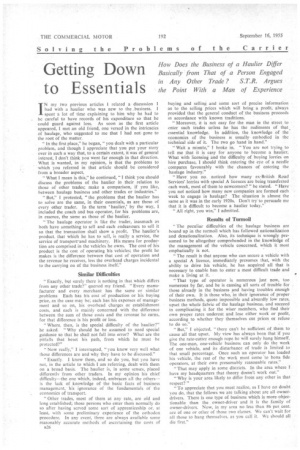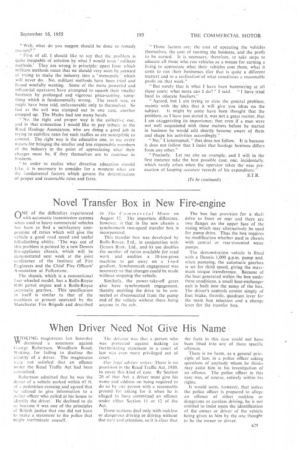Getting Down to Essentials
Page 60

Page 63

If you've noticed an error in this article please click here to report it so we can fix it.
How Does the Business of a Haulier Differ Basically from That of a Person Engaged in Any Other Trade ? S.T.R. Argues the Point With a Man of Experience
IN my two previous articles I related a discussion I had with a haulier who was new to the .business. I spent a lot of time explaining to him why he had to be careful to have records of his expenditure so that he could guard against loss. As soon as the first article appeared, I met an old friend, one versed in the intricacies of haulage, who suggested to me that I had not gone to the root of the matter.
" In the first place," he began, " you dealt with a particular problem, and though I appreciate that you put your story over in such a way that, to a certain extent, it was of general interest, I don't think you went far enough in that direction. What is wanted, in my opinion, is that the problems to which you referred in that article should be considered from a broader aspect.
" What I mean is this," he continued, "I think you should discuss the problems of the haulier in their relation to those of other trades; make a comparison, if you like, between haulage business and other trades or industries."
"But," I protested, "the problems that the haulier has to solve are the same, in their essentials, as are those of every other trader. In the term 'haulier,' by the way, I included the coach and bus operator, for his problems are, in essence, the same as those of the haulier.
"The haulage operator is like the trader, inasmuch as both have something to sell and each endeavours to sell it so that the transaction shall show a profit. The haulier's product, that which he has to sell, is really a service, the service of transporrand machinery. His means for production are comprised in the vehicles he owns. The cost of his product is the cost of operating his vehicles; the profit he makes is the difference between that cost of operation and the revenue he receives, less the overhead charges incidental to the carrying on of the business itself."
Similar Difficulties
"Exactly, but surely there is nothing in that which differs from any other trade?" queried my friend. "Every manufacturer and every merchant has the same or similar ,problems Each has his cost of production or his buying price, as the case may be; each has his expenses of management and so on, his overhead charges or establishment costs, and each is mainly concerned with the difference between the sum of those costs and the revenue he earns, for that difference is his profit or loss.
"Where, then, is the special difficulty of the haulier?" he asked. "Why should he be assumed to need special guidance so that he shall not fall into error? What are the pitfalls that beset his path, from which he must be protected?"
"Now really," I interrupted, "you know very well what those differences are and why they have to be discussed."
"Exactly. I know them, and so do you, but you have not, in the article to which I am referring, dealt with them on a broad basis. The haulier is, in some senses, placed differently from other traders. In my opinion his chief difficulty—the one which, indeed, embraces all the others— is the lack of knowledge of the basic facts of business management, his ignorance of the fundamentals of the economics of transport.
"Other trades, most of them at any rate, are old and long established; those persons who enter them normally do SO after having served some sort of apprenticeship or, at least, with some preliminary experience of the orthodox procedure. In any event, there are always available some reasonably accurate methods of ascertaining the costs of a26 . buying and selling and some sort of precise information as to the selling prices which will bring a profit, always provided that the general conduct of the business proceeds in accordance with known traditions.
"Moreover, it is not easy for the man in the street to enter such trades unless he has the rudiments of that essential knowledge. In addition, the knowledge of the economics of the business is usually embodied in the technical side of it. The two go hand in hand."
"Wait a minute," I broke in. "You are not trying to tell me that it is easy for anyone to become a haulier. What with licensing and the difficulty of buying lorries on hire purchase, I should think entering the eye of a needle compares favourably with the chances of entering the haulage industry."
"Have you no. noticed how many ex-British Road Services' lorries with special A licences are being transferred each week, most of them to newcomers? " he stated. "Have you not noticed how many new companies are formed each week to engage in haulage? The situation is almost the same as it was in the early 1920s. Don't try' to persuade me that it is difficult to become a haulier today."
"All right, you win," I admitted.
Results of Turmoil
"The peculiar difficulties of the haulage business are bound up in the turmoil which has followed nationalization and denationalization. Also, its technique is wrongly presumed to be altogether comprehended in the knowledge of the management of the vehicle concerned, which it most emphatically is not.
"The result is that anyone who can secure a vehicle with a special A licence, immediately presumes that, with the ability to drive his vehicle, he has acquired all that is necessary to enable him to enter a most difficult trade and make a living at it. • "That type of operator is numerous just now, too numerous by far, and he is causing all sorts of trouble for those already in the business and having troubles enough of their own. It is those who, in their ignorance of proper business methods, quote impossible and absurdly low rates, upset the whole fabric of the haulage business, and succeed in complicating it for the wiser members, who find their own proper rates undercut and lose either work or profit, according to whether they themselves cut prices or refuse to do so."
"But," I objected, "there can't he sufficient of them to cause all that upset. My view has always been that if you give the rate-cutter enough rope he will surely hang himself. The one-man, one-vehicle business can only do the work of one vehicle, and its disturbance of trade is limited to that small percentage. Once such an operator has loaded his vehicle, the rest of the work must come to bona fide operators, at their own presumably reasonable rates."
"That may apply in some districts. In the area where I have my headquarters that theory doesn't work out." "Why is your area likely to differ from any other in that respect? "
"To appreciate that you must realize, as I have no doubt you do, that the fellows we are talking about are all ownerdrivers. There is one type of business which is more objectionable than the owner-driver and it is the family of owner-drivers. Now, in my area no less than 86 per, cent. are of one or other of those two classes. We can't wait for all those to hang themselves, as you call it. We should all die first." " Well, what do you suggest should be done to remedy too tiers?"
" First of all, I should like to say that the problem is quite incapable-of solution by what I would term ' militant methods.' They are wrong in principle: apart from which militant methods mean that we should very soon be accused of trying to make the industry into a monopoly which will never do. No, militant methods have been tried and found woefully wanting. Some of the more powerful and influential operators have attempted to squash their smaller brethren by prolonged and vigorous price-cutting, something which is fundamentally wrong. The result was, as !Mehl have been told, unfavourable only to themselves. So fast as the evil was stamped out in one case, another cropped up. The Hydra had too many heads.
" No, the right and proper way is the collectisc one, and in that connection I would like to pay tribute to the Road Haulage Association, who are doing a good job in Irving to stabilize rates for such traffics as are susceptible to control. The right way is the educative one, to use every means for bringing the smaller and less responsible members of the industry to the point of appreciating what their charges must be, if they themselves are to continue in hiisiness, " In order to realize what direction education should take. it is necessary to consider for a moment what are the fundamental factors which govern the determination of proper and reasonable rates and fares. "Those factors are: the cost of operating the vehicles themselves, the cost of running the business, and the profit to be earned. It is necessary, therefore, to take steps to educate all those who run vehicles as a means for earning a living to appreciate what their vehicles cost them, what it costs to run their businesses (for that is quite a different matter) and to a realization of what constitutes a reasonable profit on that work."
"But surely that is what I have been hammering at all
these years; what more can 1 do? " I said. "I have .tried hard to educate hauliers."
" Agreed, but I am trying to state the general problem, mainly with the idea that it will give you ideas on the subject. It might by some have been thought that the problem. as I have just stated it, was not a great matter, that I am exaggerating its importance; that even if a man were not well acquainted with these matters before he started in business he would still shortly become aware of them and shape his activities accordingly."
"No," I interrupted, "that does not follow. It is because it does not follow that I insist that haulage business differs from any other."
"Precisely. Let me cite an example, and I will in the first instance take the best possible case, one, incidentally. which rarely arises when the operator takes the' wise precaution of keeping accurate records of his expenditure."
S.T.R.
(To be coniinued)




































































































